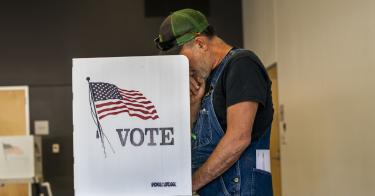School choice was on the ballot in the Iowa Republican primaries last week, and it won. It’s the latest in a series of state primaries where school choice has been emerging as a litmus-test issue for GOP primary voters.
Iowa stands out as a bellwether because of the high-profile battle over school choice between Gov. Kim Reynolds—a rising leader in the GOP who was recently tapped to respond to President Joe Biden’s State of the Union address—and fellow Republican lawmakers in the statehouse.
One of Reynolds’s top legislative priorities this year was a bill that would have created state-funded education savings accounts (ESAs) that families could use to customize their child’s education. Similar to policies in 10 other states, families could use ESAs to pay for private school tuition, tutoring, textbooks, online courses, and a variety of other education-related expenses.
Under Reynolds’s proposal, up to 10,000 ESAs worth about $5,000 annually would have been available to students with special needs or those from households earning up to four times the federal poverty line (about $110,000 for a family of four).
>>> Parents Wanted School Choice—And They Voted
"If education truly is the great equalizer," Reynolds declared, "we should create opportunities for more families to provide their children with the education choice that’s best for them. That’s exactly what this legislation does."
Reynolds’s school-choice proposal easily cleared the Iowa Senate in a vote of 31 to 18, with only one Republican joining the Democrats in opposition, but soon encountered fierce opposition in the House. Although 60 of the 100 seats in the Iowa House were held by Republicans, whose state and national party platforms endorse school choice, the measure failed to garner majority support.
Reynolds, however, didn’t give up so easily.
In an effort to pressure state lawmakers into supporting her proposal, the governor held up the budget, even waiting until after the 110th day of the legislative session, beyond which legislators are no longer paid their per diem for meals and housing. Moreover, Iowa legislators are legally prohibited from receiving campaign contributions from lobbyists and political action committees while in session.
Nevertheless, legislators in the House held firm against it, citing concerns about the effects of school choice on traditional public schools.
Both sides believed voters were with them. A Des Moines Register poll found that 52 percent of Iowans opposed the governor’s plan, while a Morning Consult poll showed that 66 percent supported ESAs. But even the first poll found that 57 percent of Iowa Republicans favored the proposal, up 8 points since last year.
The stalemate broke when Reynolds agreed to sign the budget without the legislature passing her ESA proposal. But though she lost the battle, the war was far from over.
If the current legislature wouldn’t support her agenda, she’d assemble one that would.
In the GOP primary, the governor backed nine pro-school choice candidates, including—in a rare move—several challengers to incumbent legislators who had blocked her proposal. Eight of them won.
The most prominent scalp belonged to Rep. Dustin Hite, an incumbent backed by the teachers’ union who blocked the governor’s school-choice bill as Chair of the House Education Committee. He was soundly defeated by school-choice proponent Helena Hayes, who secured 57% of the vote.
"I might as well come out and say it," declared Rep. Dennis Bush, who opposed Reynolds’s proposal, "The governor is trying to use this election as a referendum for her voucher bill."
Bush was right—and the people have spoken.
Bush secured less than a quarter of the vote in a three-way primary race won handily by choice supporter Zachary Dieken, who earned over 55% of the vote.
Opponents of school choice have long claimed that the issue was a political loser and, despite polling to the contrary, many in the establishment believed that narrative. These election results, particularly in Iowa, dispel that narrative.
>>> Parents’ Guide to Children’s Rights Aims to Save America’s Public Schools From CRT
Nationwide, 47 out of 59 candidates supported by the pro-school choice American Federation for Children Action Fund and its affiliates have won their primaries or advanced to run-offs so far this year.
These results shouldn’t be surprising. Earlier this year, a RealClearOpinion poll found that 72 percent of registered voters nationwide favored school choice, including 67 percent of independents, 68 percent of Democrats, and 82 percent of Republicans.
The pandemic taught parents the value of having the freedom to choose the learning environments that are the right fit for their children and that align with their values. Politicians who stand in the way of parents seeking to educate their children as they see fit are now paying a political price.
These wins may set the stage for Reynolds to enact her school-choice proposal in the 2023 Iowa legislative session. They are also likely a harbinger of things to come as other politicians seek to replicate the Reynolds playbook.
This piece originally appeared in Fox News





